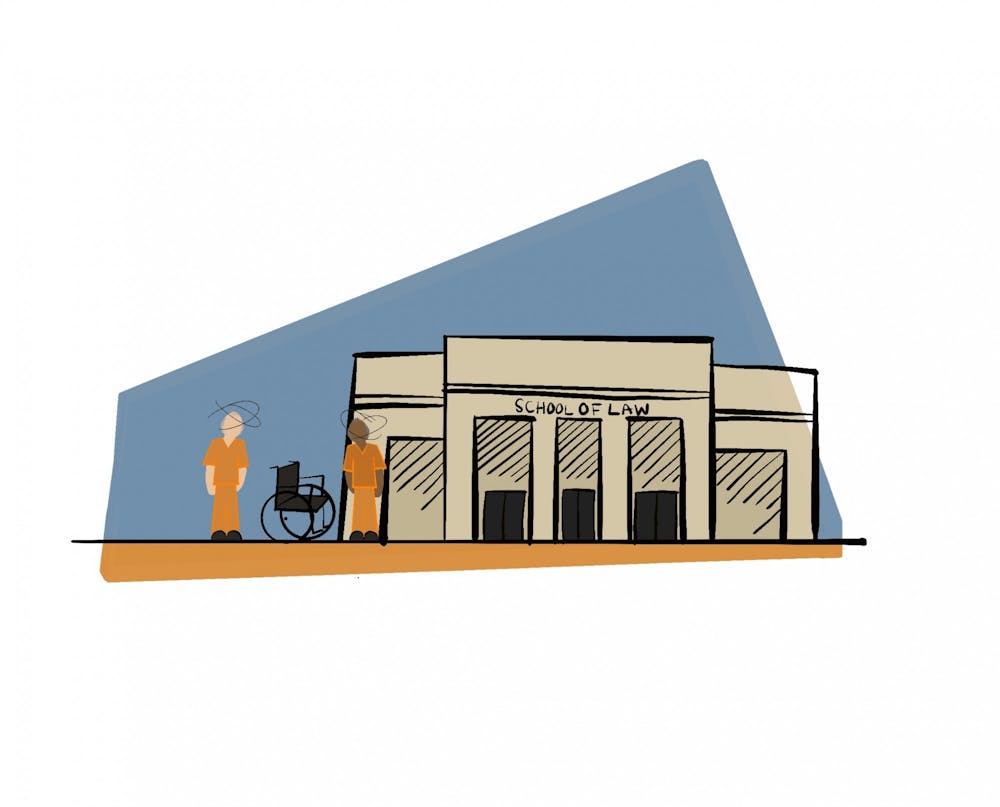Continuing research by professors at the School of Law that highlights the increasing rate of people in federal and state prisons suffering from dementia. This research continues that which was included in the “Persons Living With Dementia in the Criminal Legal System” report released June 15 by the American Bar Association’s Commission on Law and Aging in their mission to secure the legal rights of the older population.
Dementia is a decline in cognitive function that typically interferes with daily life, such as the ability to reason or remember. It is common in the older population, people aged 65 and over, with approximately a third of Americans over the age of 85 having the condition.
Richard Bonnie, director of the Institute of Law, Psychiatry and Public Policy and Harrison Foundation professor of law and medicine, worked on the report at the University’s Institute of Law Psychiatry and Public Policy. He collaborated closely with Lucy Guarnera, assistant professor of Psychiatry and Neurobehavioral Sciences, and Sarah Leser, Institute of Law Psychiatry & Public Policy research specialist.
Guarnera became interested in the project upon noticing a gap in the progress around psychological provisions in the legal systems for older adults.
“The legal system for the past 50 years or so has continually created more and more protections for juveniles in the criminal legal system and people with mental illness in the criminal legal system,” Guarnera said. “Older adults and older adults with dementia were sort of left out in the cold and much less attention has been paid to them. This problem of older adults with dementia in the criminal legal system has been growing and growing fast.”
The growing rate of dementia in prison populations coincides with a surge of geriatric incarcerated people and may indicate a growing issue for medical care in prison systems.
There is an increasing number of incarcerated people over 50 years old. This is notably the age at which a prisoner is labeled as geriatric due to the faster rate of aging commonly seen in life-long imprisoned people.
As a consequence of harsher criminal punishments and longer sentencing terms nationally in the 1980s and 1990s, there has been a large shift in the average age of imprisoned people. 22.8 percent of confined prisoners were 50 years or older in 2019, according to the 2021 Virginia Department of Corrections Annual Report.
Lawmakers and medical officials are now dealing with the question of how to handle the increasing rates of people suffering from dementia as a subsequent increase of dementia in prison populations is now expected to grow. Guarnera noted that access to treatment and favorable environments for those with dementia is particularly difficult to come by in the prison setting.
“Jails and prisons are highly rule-bound environments,” Guarnera said. “You can imagine somebody… who is having that behavioral disinhibition that can come with dementia where you may be acting out or yelling or not being able to kind of control your behavior, does not fly in a carceral environment. [Those behaviors] get you in trouble, can get you hurt, and can get you sanctions.”
The American Bar Association’s report recommends dementia screenings for arrested and incarcerated individuals. The Federal Medical Center in Devens, Mass. opened the first Memory Disorder Unit for people in prison with dementia in 2019, with other states following their lead. These specialized units have trained medical staff and are modeled after nursing home dementia units. Some facilities even have programs to train younger incarcerated people to tacke care of those with dementia.
As these units are not yet widely available, however, many imprisoned people with dementia are put instead in isolation. Others file motions for compassionate release, a statutory provision that allows for the release of a person in federal prison under extraordinary circumstances not present at the time of sentencing.
Federal Public Defender Andrea Harris works on compassionate release cases at the Federal Criminal Sentence Reduction Clinic at the School of Law.
“So far we haven't filed any motions for compassionate release for people with dementia,” Harris said. “But, that is definitely something that we would do or we could do if we came across that kind of situation… One could make a written request to the board and asking them to file one of these motions on behalf of the inmate.”
This problem of how to handle the increasing number of incarcerated people with dementia lies at the intersection between systemic medical and judicial proceedings. The treatment of incarcerated individuals with dementia calls into question bioethical concerns, human rights and civil rights concerns. Though the report has been concluded, others at the Institute of Law, Psychiatry, and Public Policy will continue their research, now focusing on the implementation of potential solutions in Virginia specifically, Guarnera said.
Third-year Law student Amalia Garcia-Pretelt said there is momentum among students at the Law School to focus on this type of work and question the legal system. Students at the Federal Criminal Sentence Reduction Clinic work on compassionate release cases for incarcerated people, focusing primarily on the Albemarle community.
“It's an exciting moment at the law school specifically, as there's a lot of interest in public defense and working with people in prison,” Garcia-Pretelt said. “I wish people in general and people in law school, specifically people who want to be prosecutors and potentially put people in prison, knew more and understood that incarcerated people are people just like the rest of us.”
Correction: A previous version of this article referred to Amalia Garcia-Pretelt as a second-year Law student. Garcia-Pretelt is a third-year Law student, and the article has been updated to reflect that.







